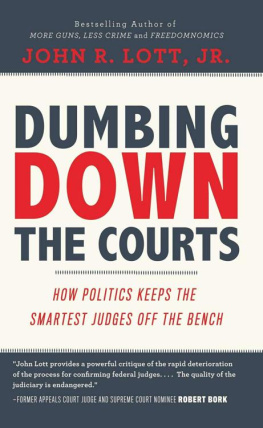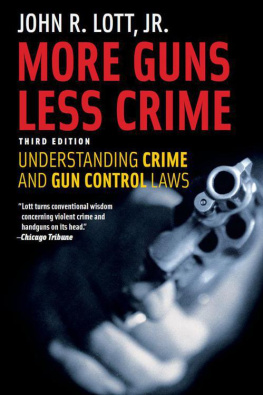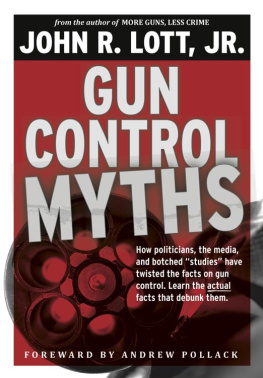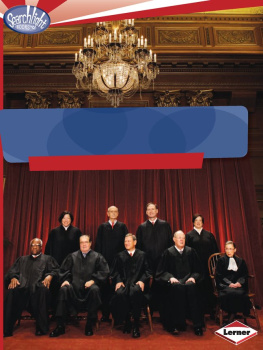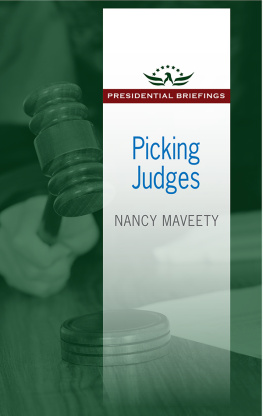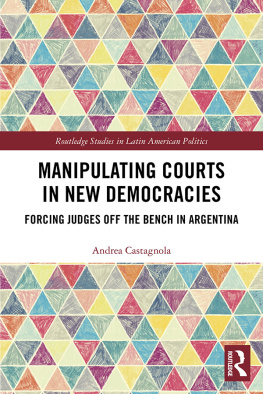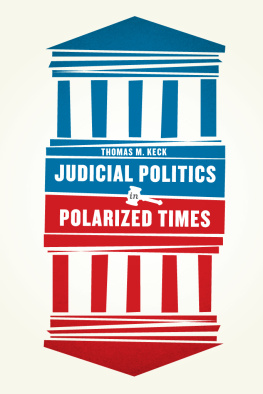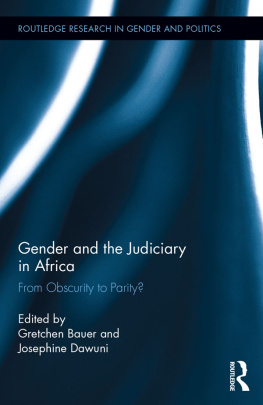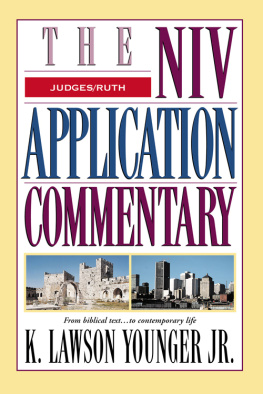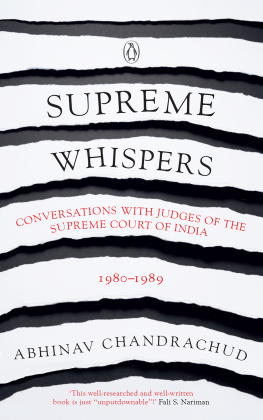PRAISE FOR DUMBING DOWN THE COURTS
Dumbing Down the Courts is a critical read for anyone who seeks to understand the judicial confirmation battles of recent decades. Lotts meticulous research demonstrates that these contentious battles result from a politicized process in which both activist judges and partisan senators are to blame. When activist judges abandoned their limited, constitutional role and usurped the functions of elected legislators, senators reacted by using political litmus tests in assessing judicial candidates. The surest fix to drawn-out confirmation battles is to ensure that judges adhere to their proper role: to apply the law as it is written.
Edwin Meese , former U.S. Attorney General
John Lott provides a powerful critique, amply supported by facts, of the rapid deterioration of the process for confirming federal judges. As courts have become more political and government has grown increasingly intrusive, battles over confirmations have grown more intense and partisan, with the result, Mr. Lott concludes, that the quality of the judiciary is endangered.
Robert Bork , former U.S. Appeals Court judge and Supreme Court nominee
This book is a serious effort to identify and grapple with the current problems in our judicial nominations process. Unlike the many partisan works on the subject, John Lott does not lay the blame of our current troubles on one partys doorstep but demonstrates that there is more than enough fault to go around. Even those who disagree with the authors conclusions will be well advised to read this excellent book.
William P. Marshall , professor, University of North Carolina Law School, and former Deputy White House Counsel to President Clinton
The judicial confirmation process has become increasingly politicized on both sides of the aisle. The result has been increasing difficulty and delay in confirming presidential nominees. In this important study, John Lott marshals the evidence on this issue, that the modern confirmation process has affected not only the quantity but also the quality of federal judges.
Alan Sykes , professor, New York University School of Law
Clear, thoughtful, and eminently readable, Dumbing Down the Courts describes and explains the politicization of the judicial confirmation process. John Lott is carefully non-partisan throughout: neither party comes off looking clean. Be prepared to be troubled, howeverbadly troubled. The book will leave thoughtful readers concernedconcerned not just about the degraded judicial confirmation process, but about the effect that the process has had on the quality of the courts.
J. Mark Ramseyer , professor, Harvard Law School
ALSO BY JOHN R. LOTT, JR.
At the Brink: Will Obama Push Us Over the Edge?
Debacle: Obamas War on Jobs and Growth and What We Can Do Now to Regain Our Future
(with Grover G. Norquist)
More Guns, Less Crime: Understanding Crime and Gun Control Laws
Straight Shooting: Firearms, Economics and Public Policy
Freedomnomics: Why the Free Market Works and Other Half-Baked Theories Dont
The Bias Against Guns: Why Almost Everything Youve Heard About Gun Control Is Wrong
Are Predatory Commitments Credible? Who Should the Courts Believe?
HOW POLITICS KEEPS THE SMARTEST JUDGES OFF THE BENCH
JOHN R. LOTT, JR.
Bascom Hill Publishing Group | Minneapolis, MN
To Frank Easterbrook, a brilliant man
Copyright 2013 by John R. Lott, Jr.
Bascom Hill Publishing Group
322 First Avenue N, 5th floor
Minneapolis, MN 55401
612.455.2293
www.bascomhillpublishing.com
All rights reserved. No part of this publication may be reproduced, stored in a retrieval system, or transmitted, in any form or by any means, electronic, mechanical, photocopying, recording, or otherwise, without the prior written permission of the author.
ISBN-13: 978-1-62652-402-6
LCCN: 2013942834
eBook Design by Lindsay Jones
Manufactured in the United States of America
CONTENTS
ACKNOWLEDGMENTS
I must particularly thank Frank Easterbrook, Richard Epstein, Mitu Gulati, John McGinnis, Nelson Lund, William Marshall, Mark Ramseyer, Peter Wallison, and the participants in seminars at the University of Chicago Law School, University of Tokyo, William and Mary Law School, American Law and Economic Association Meetings, and George Mason Law School, all of whom furnished valuable comments. Brian Blas, Roger Lott, Ryan Lott, Jill Mitchell, Jack Soltysik, and Soojin Kim provided valuable research assistance on the book in many different ways, including spending numerous months collecting the data. I must particularly thank Maxim Lott, Karina Rollins, and Gertrud Fremling, as they offered extremely helpful advice and edited parts of the book.
Chapters 3 and 4 draw heavily on research that I have published in the Journal of Empirical Legal Studies , vol. 2, no. 3 (November 2005): 40747. Chapter 5 is drawn from the research that I have published in Public Choice (2011).
INTRODUCTION
Why the Senate Shuns the Smartest Judges
Judges will ultimately decide whether people of the same sex can marry each other, whether marriages can involve more than two people, whether unions can mandate that employees pay dues that go to political campaigns, and countless other issues that will impact your life in fundamental ways. Yet, the personal characteristics that make some judges less confirmable than others have received little study. Who are the nominees that make it through the confirmation process to become a federal judge? Are they the brightest people who have the most detailed and sophisticated knowledge of the law? Are the most successful lower court judges also the most likely to get promoted to serve on higher courts?
Surprisingly, the qualities that make someone a successful judge also make them less likely to be confirmed for the same reason that smart, persuasive people are rarely asked to be jurors. Take Greg Mankiw, a well-known Harvard economics professor who was recently called up for jury duty in the Boston area. After sitting around most of the day waiting to be considered, Mankiw noted: I was called up and sat in the jury box, but that lasted for only about five minutes [before] one of the sets of lawyers used a peremptory challenge to kick me [off the jury]. The whole experience caused him to wonder: Why does being a professor of economics at Harvard make one an undesirable juror in such a case?
The answer is actually pretty simple: a smart person who makes his living persuading others could end up swaying other jurors. If lawyers on either side of the case have even a hint that someone like Mankiw may work against their side, they will use one of their peremptory challenges to remove him from the juror pool. In their eyes, removing him from the jury is the equivalent of removing several other equally biased jurors.
Similarly, for judges on a circuit court or the Supreme Court, a smart, persuasive judge might convince other judges to change their votes on a case. Judges who can write powerful judicial decisions also tend to be cited more frequently and influence judicial decisions made by other judges.

